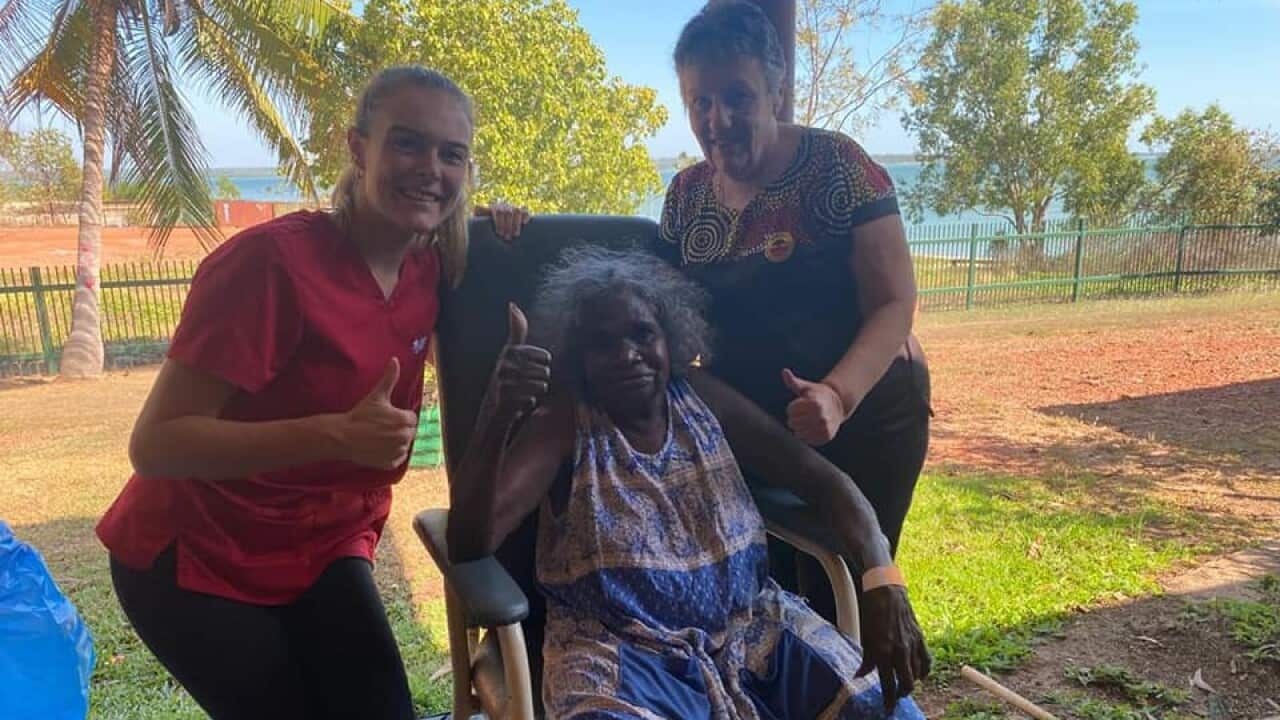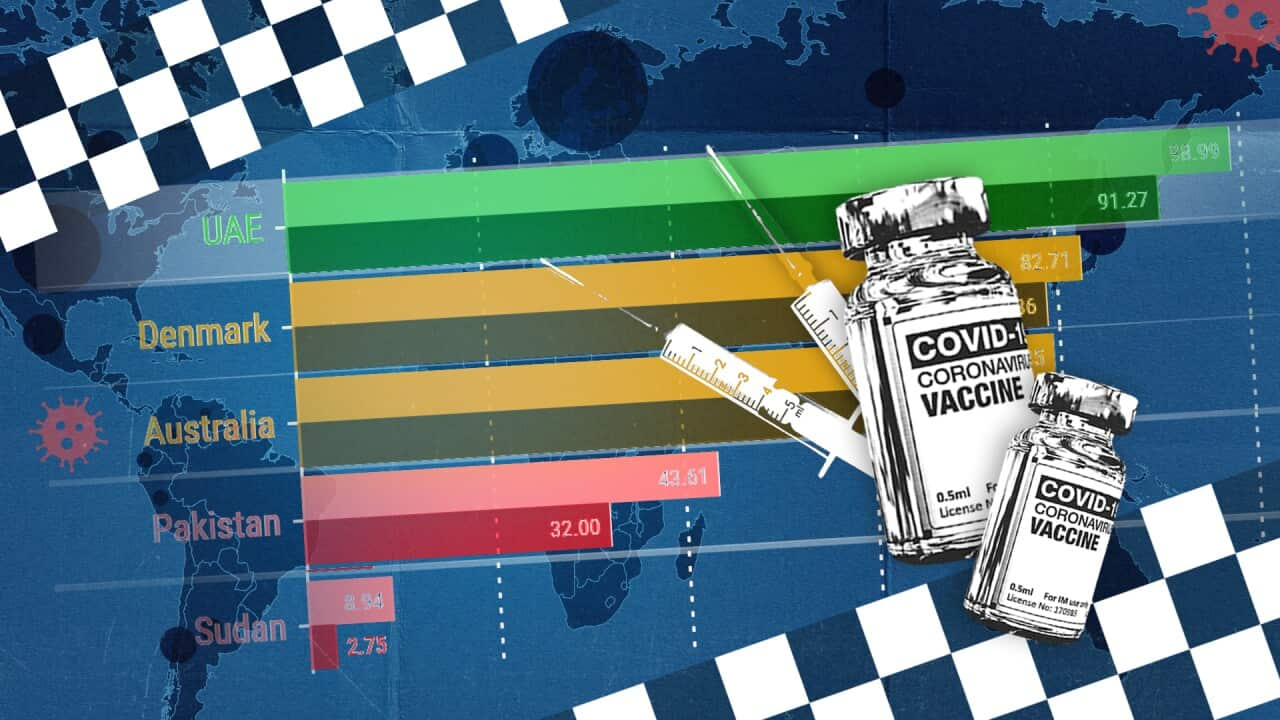

8 min read
This article is more than 3 years old
Explainer
What you need to know about COVID-19 booster shots after the new Omicron variant
Will the vaccines stop Omicron? The jury is still out. But experts have indicated the current vaccines and booster shots may still offer protection against the new variant.
Published
Updated
By Biwa Kwan
Source: SBS News
Image: A woman receives a COVID-19 vaccination at the Australian Sikh Association pop-up clinic in Sydney in August. (Getty Images/SBS News)
The new COVID-19 variant, Omicron, has been designated as a variant of concern by the World Health Organization, with widespread speculation existing vaccines may not be as resistant to it.
New formulations to vaccines may be needed, with Pfizer saying it could tweak its existing vaccine within 100 days and Moderna announcing it could achieve the same result by early 2022.
While the jury is still out on the efficacy of the existing vaccines against the new variant, we’re “not back at square one” according to Victoria’s Chief Health Officer Brett Sutton, with existing vaccines still providing some level of “protection against these variants as well”.
Federal Health Minister Greg Hunt has urged Australians to get booster shots.
"When we see the variants such as Omicron, and inevitably there will be more variants, we know the boosters will help keep us safe," he told reporters in Melbourne last week.
"The booster program is fundamentally important."
Who needs booster shots?
Australia’s COVID-19 booster vaccination program kicked off in October after Mr Hunt announced the government would prioritise the 500,000 Australians with the most weakened immune systems, including people with malignant cancers, organ transplants and those born with immunodeficiencies.
Since 8 November, however, booster doses have been available to anyone aged 18 and over who has had both doses of their primary COVID-19 vaccine course.
The Australian Technical Advisory Group on Immunisation (ATAGI) is not currently recommending booster doses to people aged 12 to 17, and severely immunocompromised people who have had a third dose to complete their primary vaccination.

People at the Boondall mass vaccination hub in Brisbane. Source: AAP
How soon should you get a booster shot?
For the general population, the updated ATAGI advice is that booster doses given the likelihood of ongoing transmission of the Omicron and Delta variants.
The recommended interval for the third dose for the severely immunocompromised is between two and six months after the second dose.
In exceptional circumstances, such as an outbreak or intensification of immunosuppression, the interval may be reduced to four weeks.
How do booster shots work?
The vaccine technology underlying the booster shots is the same as the first and second vaccine doses.
Dr Emily Edwards from the Department of Immunology and Pathology at Monash University said the building blocks for booster shots draw from the knowledge developed from vaccines in the past, including for hepatitis and human papillomavirus (HPV) which form part of the immunisation programs in schools.
"It is all about building blocks," she told SBS News in October. "The technology may have been there for years, and that is the case with the vaccines and with the immunological tools we use to monitor how you respond to the vaccine and the virus."
The booster shot is aimed at ensuring the level of immunity and protection from the earlier doses of the vaccine is maintained at a certain level as the effect from the antibodies wears off over time.
"A booster dose, six or more months after the second dose, will make sure that the protection from the first doses is even stronger and longer-lasting and should help prevent spread of the virus," Mr Hunt said in October.
Which booster shot should you get?
Australians have access to both Pfizer and Moderna booster shots, and medical experts say .
Although not preferred, ATAGI advice is that AstraZeneca can be used for a third dose if you had it for your earlier shots and did not suffer any adverse reaction.
It can also be used for those who had a significant adverse reaction after a previous mRNA jab, the class of vaccine to which Pfizer and Moderna belong.
How can I book?
Boosters are available for eligible people via medical practitioners and vaccination clinics.
You can find thousands of vaccination providers and book your third jab via the government's website. If you experience issues with the website, you can call the National Coronavirus Helpline on 1800 020 080.
People in Australia can also contact their preferred clinic or practitioner directly.

Healthworkers at a drive-through COVID-19 vaccine hub in Melbourne. Source: AAP
How effective are booster shots?
Scientists are racing to find out whether or not the current vaccines offer protection against the Omicron variant.
Pfizer has said , even though the initial two doses appear less effective.
It said while two doses may not be protective enough to prevent infection, lab tests showed a booster increased by 25-fold people's levels of virus-fighting antibodies.
In the case of the Delta variant, however, the vaccines continued to maintain high levels of protection against severe hospitalisation and death.
Dr Edwards said as Australian jurisdictions reopen and exit lockdown, other public health tools such as masks and physical distancing will still be necessary. But the effectiveness of vaccines still remains high - including for booster shots.
"If you have a vaccine, you're more likely to be protected from that than someone who isn't. There will still be some infections, unfortunately. But it does mean it [may] still , which is really important, especially in this global pandemic."
Dr Quinn said studies from Israel, which moved to booster shots earlier than most nations after a rapid vaccine rollout, show that breakthrough infections were actually showing up in immunocompromised patients who were not responding to earlier vaccine doses, making the case for booster shots for this group.
"They only make up two per cent of the population, this group of individuals. But, for example, in Israel, they were making up . So it is clear that we need to do more to help protect against that severe disease."
Dr Quinn said the data from Israel on the efficacy of booster shots needs more scrutiny, but anecdotal reports of booster shots on the show an immediate impact on hospitalisation rates.
"And that would make sense because these third shots give an immediate boost to the immune response. It would probably provide that immediate protection. We still need to understand how durable that protection is."
She added that studies out of the and demonstrate robust vaccine effectiveness in the booster shot.
Are there any risks or side effects?
As the booster shots are the same vaccines used for the earlier shots, the advice on side effects is expected to track along the same lines. But health authorities around the world are closely observing any long-term effects.
"The fact that other countries including the UK are six months ahead of us in terms of their vaccine regimen means we will get that information quicker and be able to respond to it in terms of timing and requirement for booster shots," Dr Edwards said in October.
Dr Quinn said there have been small trials looking at immunocompromised people with third doses. A recent who received a third vaccine dose.
"With this particular group of patients, there have been good studies that have shown that is clearly beneficial to receive that third dose."
Do we have enough doses for everyone?
Mr Hunt in October said Australia was well prepared to provide booster doses.
"With over 151 million Pfizer, Novavax and Moderna vaccines already secured for supply into the future, Australia is well prepared to provide booster doses as approvals are provided by the medical experts," he said.
Infectious diseases expert Sanjaya Senanayake has previously said internationally, the discussion of booster shots in rich nations has put the spotlight on vaccine equity as it applies to the provision of first and second doses for developed nations.
"At the end of the day, if we're protected from severe illness and hospitalisation [in Australia], we should try and help the rest of the world," he said. "We have to be selfless to be selfish when it comes to COVID-19 and vaccination," he added, referring to herd or population-wide immunity in the Asia-Pacific region.
This article was originally published on 9 October 2021 and was last updated on 14 December 2021.
Additional reporting: Evan Young, Shuba Krishnan, Akash Arora.



